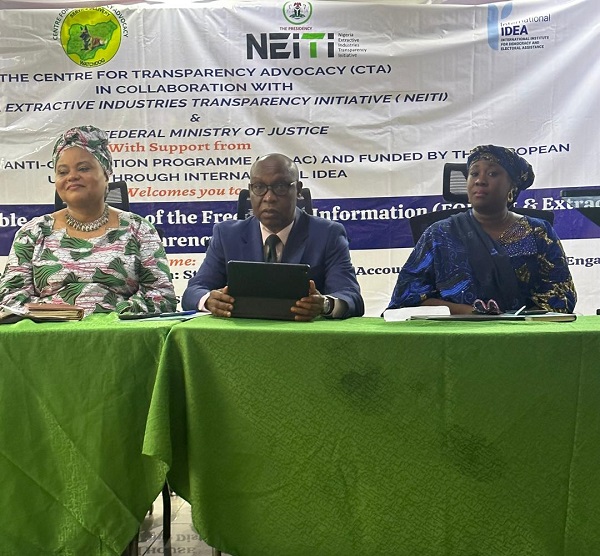In the middle: Executive Secretary of NEITI, Dr. Orji Ogbonnaya Orji; to his left, Executive Director of the Centre for Transparency and Advocacy, Engr. Faith Nwadishi; and to his right, Civil Society Representative on the NEITI Board, Dr. Erisa Danladi Sarki — at the Strengthening Accountability and Governance in Nigeria Initiative (SAGNI) Roundtable on 14 Years of the Freedom of Information (FOI) Act and Extractives Transparency in Nigeria.
…Calls for Sanctions, Urges CSOs, Security Agencies to Tackle the Abuse of Nigeria’s Freedom of Information Law
The Nigeria Extractive Industries Transparency Initiative (NEITI) has raised alarm over disturbing misuse of the Freedom of Information (FOI) Act by individuals and faceless groups posing as civil society organisations (CSOs) and non-governmental organisations (NGOs) with no track record, known address, or institutional credibility.
Speaking at a high-level Roundtable commemorating 14 years of the FOI Act held at NEITI House, Abuja, the Executive Secretary of NEITI, Dr. Orji Ogbonnaya Orji, described the trend as “a dangerous weaponization of a noble democratic law to blackmail, harass, and extort public officials and government institutions.”
“Let there be no mistake: this is not activism—it is sabotage,” Dr. Orji declared in his keynote address. “These fake NGOs and touts’ parade false identities, file FOI requests under misleading pretenses, and then engage in media blackmail and threats to extract money. They have no interest in facts or transparency. Their only mission is extortion. And it must stop.”
Dr. Orji emphasized that the FOI Act, passed in 2011, is a landmark law in Nigeria’s democratic journey, protecting citizens’ right to know and empowering oversight over government. But he warned that unless urgently safeguarded, the Act risks becoming a tool for intimidation and abuse rather than transparency and accountability.
“At NEITI, we have responded to 72 FOI requests in the last decade, operate a dedicated FOI portal, put in place a proactive disclosure platform on our website, published annual progress reports, convened regular media briefings, series of stakeholders’ forums, and submitted annual compliance reports,” Dr. Orji said. “Our reports, Beneficial Ownership Register, procurement process and implementation information and data are all proactively disclosed and freely placed in the public domain. We are currently working to complete work on the NEITI Data Centre to add to wider public access to credible information. But these fake NGOs ignore these disclosures and instead resort to threats aimed at coercion and extortion.”
To address this growing menace, NEITI called for urgent legal and institutional reforms. Among the strategic recommendations proposed are:
- Amending the FOI Act to criminalize and place stringent sanctions on false FOI claims, blackmail, and identity fraud.
- Establishing an independent oversight/redress mechanism to verify the legitimacy of FOI requests.
- Institutionalizing FOI Units in all MDAs with trained, professional staff.
- Accelerating subnational implementation of the FOI Act across all states.
- Rolling out civic education campaigns on responsible use of the FOI Act.
NEITI further urged all anti-corruption agencies—the Economic and Financial Crimes Commission (EFCC), the Independent Corrupt Practices and Other Related Offences Commission (ICPC), the Code of Conduct Bureau (CCB), and others—to remain focused on their mandates and resist the temptation of being distracted by the activities of these faceless NGOs and fake CSOs.
Dr. Orji stressed the importance of distinguishing between genuine civil society oversight and fraudulent campaigns masked as activism. He urged law enforcement agencies, media regulators, and civil society platforms to join hands in weeding out impostors that threaten the integrity of Nigeria’s accountability ecosystem.
“The FOI Act is not a blackmail license. It is a promise of truth, openness, and democratic empowerment. We must protect that promise from abuse. NEITI will not be intimidated, and we will continue to expose and resist such unethical conduct.”
Also speaking at the event, Engr. Faith Nwadishi, Executive Director of the Centre for Transparency Advocacy (CTA), reaffirmed that NEITI remains a model of proactive disclosure and institutional responsiveness.
“NEITI’s reports are vital instruments of transparency. They guide FOI implementation and provide facts that expose corruption and support accountability,” she stated.
In her remarks, Dr. Erisa Danladi Sarki, Civil Society Representative on the NEITI Board and National Coordinator of Publish What You Pay (PWYP), called for stronger multi-stakeholder vigilance and sustained advocacy to protect the FOI Act.
“We must not allow faceless actors to erode public trust in FOI. Citizens deserve tools that empower, not harm them. The FOI Act must remain a shield for truth—not a sword for deception.”
NEITI commended the Centre for Transparency Advocacy (CTA) for its leadership in convening the Roundtable, as well as the Federal Ministry of Justice and the Rule of Law and Anti-Corruption (RoLAC) Programme, which co-organised the event under the Strengthening Accountability and Governance in Nigeria Initiative (SAGNI).
In his remarks, Mr. Emmanuel Uche, Programme Manager of the RoLAC Programme funded by the European Union (EU), reaffirmed the EU’s commitment to supporting Nigeria’s democracy and rule of law through initiatives that strengthen access to information and transparency.
“The FOI Act is central to empowering citizens, ensuring justice, and strengthening governance. RoLAC, with EU support, is proud to partner with NEITI, CTA, and other institutions to promote responsible access and institutional accountability in Nigeria,” Mr. Uche stated.
The Roundtable was attended by senior government officials, the Federal Ministry of Justice, development partners, the Open Government Partnership (OGP), anti-corruption agencies, civil society, and the media.
NEITI reaffirmed its unwavering commitment to transparency, accountability, and good governance in Nigeria’s extractive industries and beyond.


Comment here